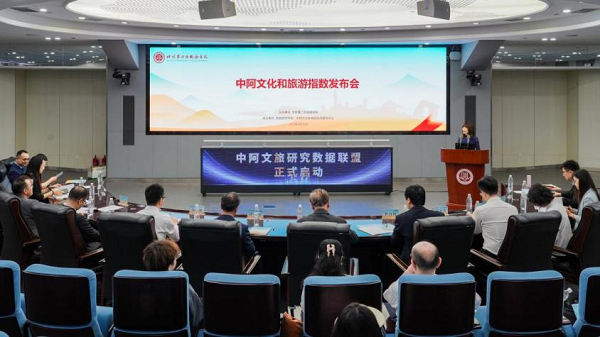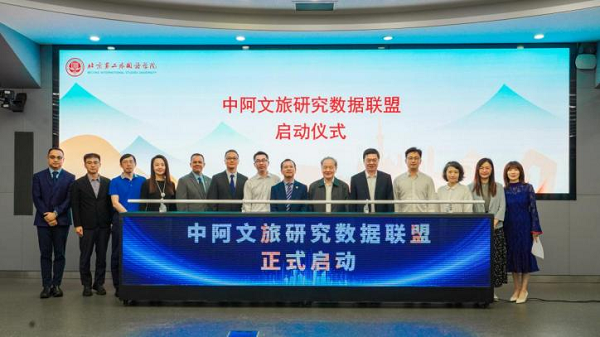
The China-Arab Culture and Tourism Index Conference was hosted at Beijing International Studies University (BISU) on June 20 with the support of its School of Tourism Sciences and the China-Arab Cultural and Tourism Cooperation Research Center (CACTCRC).

The China-Arab Culture and Tourism Index Conference takes place at BISU on June 20.
The opening remarks session was hosted by Professor Cheng Wei, a member of the Standing Committee of the CPC BISU Committee and vice-president of the university.
Wang Chao, director of the Asia-Africa Division of the Bureau of International Exchange and Cooperation of the Ministry of Culture and Tourism, emphasized the significance of the BISU-CACTCRC as an important platform for institutionalizing China-Arab cultural exchanges, and highlighted its role in promoting cultural and tourism cooperation.
Guo Zhaoliang, deputy director of the Scientific Research Division of the Beijing Municipal Education Commission, spoke about the unique advantages and crucial role of universities in regional and country-specific studies, commending BISU's outstanding contributions in this field.
Ji Jinbiao, deputy secretary of the CPC BISU Committee and president of the university, elaborated on BISU's efforts and achievements in China-Arab cultural exchange and cooperation research, and he expressed a commitment to leveraging its strengths in language, culture, and tourism to support China-Arab cultural exchanges with intellectual resources.
The keynote speech session was chaired by Professor Lyu Ning, dean of the School of Tourism Sciences.
Keynote speakers, including Wu Sike, China's former Special Envoy for the Middle East issue, Li Jinsong, vice general manager at TravelSky Technology Limited and Anouar Chetoui, country manager for Greater China at the Tunisian National Tourist Office, shared unique insights into China-Arab cultural and tourism development from their respective perspectives.
The core research outcome, the "2024 China-Arab Culture and Tourism Index", jointly compiled by the School of Tourism Sciences and the CACTCRC, was officially released by Professor Deng Ning, deputy dean of the School and director of the Digital Culture and Tourism Research Center at BISU.
Wan Ting, deputy director of the Sino-Foreign Culture and Tourism Exchange Center of the Ministry of Culture and Tourism, provided an in-depth interpretation of the index.
The index has a hierarchical indicator system of "4+11+35", including four primary dimension indicators: activity, diversity, innovation, and experience, along with 11 sub-dimension indicators and 35 specific measurement indicators. It integrates extensive bilateral cultural and tourism data from China and 12 Arab countries in 2024, covering diverse sources and modalities such as telecommunications operators, aviation information, media sentiment, and mainstream social platforms.
The index is supported by data and technology from companies and institutions like China Unicom Data Intelligence, TravelSky Technology Limited, Ant Group, the Academy of Contemporary China and World Studies, and BISU's Digital Culture and Tourism Research Center.
It also further leveraged cutting-edge AI technology to analyze large-scale media and OTA data, generating data-driven decision support for elevating China-Arab cultural and tourism cooperation.
The 2024 China-Arab Culture and Tourism Index scored 82.67, reflecting a high level of cooperation and development potential in the cultural and tourism sectors between China and Arab countries.
In terms of activity, the UAE emerged as the top destination for Chinese tourists in Arab countries, with over a million visits, followed by Qatar, Egypt, and Saudi Arabia. Saudi Arabia and the UAE accounted for 57 percent of Arab tourists visiting China.
The overall spending pattern of Chinese tourists in Arab countries showed a high concentration, indicating significant consumption potential. Data showed that the average spending of Chinese tourists in Arab countries was 4,282 yuan($598), while Arab tourists spent an average of 4,136 yuan in China, with UAE and Saudi Arabian tourists being the main contributors to spending in China.
In terms of diversity, Arab countries have 47 world heritages, while most of them are located in Saudi Arabia, Egypt and Morocco.
In terms of innovation, China leads in mobile payment and smart tourism applications globally; Qatar, the UAE, Bahrain, and Saudi Arabia are leaders in mobile payment among Arab countries; and the UAE, Saudi Arabia, and Qatar are also at the forefront in AI technology applications.
In terms of experience, bilingual translation, transnational procedures, and travel convenience are key concerns for bilateral tourists. The study found that the four dimensions of activity, diversity, innovation, and experience show a pattern of coordinated and balanced development, laying a solid foundation for sustainable China-Arab cultural and tourism cooperation.
The leading advantage in the activity dimension also confirms that frequent interactions and policy support are key driving forces for cultural and tourism cooperation.
The conference also marked the launch of the "China-Arab Culture and Tourism Research Data Alliance". Led by the BISU-CACTCRC, the alliance brings together leading research institutions and top data-driven enterprises in inbound and outbound tourism to pool resources and jointly advances China-Arab culture and tourism big data research and application, providing ongoing intellectual support and data services for China-Arab cultural and tourism cooperation.

The China-Arab Culture and Tourism Research Data Alliance is launched at BISU on June 20.
The BISU-CACTCRC, co-established by the Ministry of Culture and Tourism and the Beijing Municipal Government, aims to implement the "Eight Major Cooperation Initiatives" for pragmatic China-Arab cooperation, promoting deeper and more practical China-Arab cultural exchanges through academic exchanges, talent cultivation, training, cooperative research, and industry promotion.
The "China-Arab Cultural and Tourism Index" project takes a crucial step in quantitatively assessing the effectiveness of China-Arab cultural and tourism exchanges and insights into cooperation trends.
The BISU-CACTCRC will continue to use index as a regular research project, periodically releasing index reports to provide data support and decision-making references for government policy-making, market insights for enterprises, and in-depth research for academia.

Links
